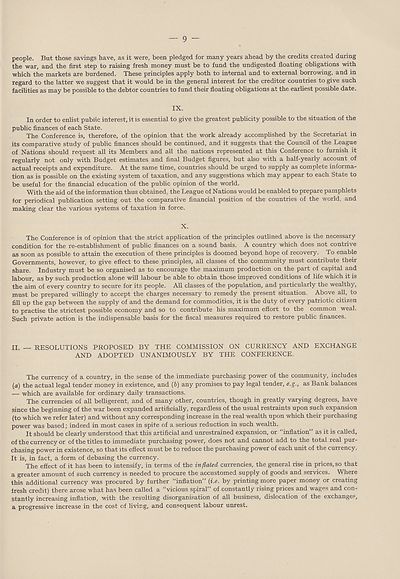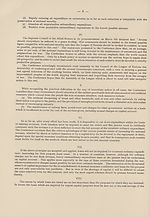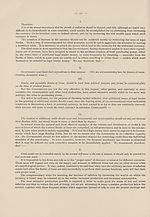Economic and financial section > Brussels Financial Conference 1920 : the recommendations and their application : a review after two years. Vol. 2, Italy
(11)
Download files
Complete book:
Individual page:
Thumbnail gallery: Grid view | List view

9
people. But those savings have, as it were, been pledged for many years ahead by the credits created during
the war, and the first step to raising fresh money must be to fund the undigested floating obligations with
which the markets are burdened. These principles apply both to internal and to external borrowing, and in
regard to the latter we suggest that it would be in the general interest for the creditor countries to give such
facilities as may be possible to the debtor countries to fund their floating obligations at the earliest possible date.
IX.
In order to enlist public interest, it is essential to give the greatest publicity possible to the situation of the
public finances of each State.
The Conference is, therefore, of the opinion that the work already accomplished by the Secretariat in
its comparative study of public finances should be continued, and it suggests that the Council of the League
of Nations should request all its Members and all the nations represented at this Conference to furnish it
regularly not only with Budget estimates and final Budget figures, but also with a half-yearly account of
actual receipts and expenditure. At the same time, countries should be urged to supply as complete informa¬
tion as is possible on the existing system of taxation, and any suggestions which may appear to each State to
be useful for the financial education of the public opinion of the world.
With the aid of the information thus obtained, the League of Nations would be enabled to prepare pamphlets
for periodical publication setting out the comparative financial position of the countries of the world, and
making clear the various systems of taxation in force.
X.
The Conference is of opinion that the strict application of the principles outlined above is the necessary
condition for the re-establishment of public finances on a sound basis. A country which does not contrive
as soon as possible to attain the execution of these principles is doomed beyond hope of recovery. To enable
Governments, however, to give effect to these principles, all classes of the community must contribute their
share. Industry must be so organised as to encourage the maximum production on the part of capital and
labour, as by such production alone will labour be able to obtain those improved conditions of life which it is
the aim of every country to secure for its people. All classes of the population, and particularly the wealthy,
must be prepared willingly to accept the charges necessary to remedy the present situation. Above all, to
fill up the gap between the supply of and the demand for commodities, it is the duty of every patriotic citizen
to practise the strictest possible economy and so to contribute his maximum effort to the common weal.
Such private action is the indispensable basis for the fiscal measures required to restore public finances.
II. — RESOLUTIONS PROPOSED BY THE COMMISSION ON CURRENCY AND EXCHANGE
AND ADOPTED UNANIMOUSLY BY THE CONFERENCE.
The currency of a country, in the sense of the immediate purchasing power of the community, includes
(a) the actual legal tender money in existence, and (6) any promises to pay legal tender, e.g., as Bank balances
— which are available for ordinary daily transactions.
The currencies of all belligerent, and of many other, countries, though in greatly varying degrees, have
since the beginning of the war been expanded artificially, regardless of the usual restraints upon such expansion
(to which we refer later) and without any corresponding increase in the real wealth upon which their purchasing
power was based; indeed in most cases in spite of a serious reduction in such wealth.
It should be clearly understood that this artificial and unrestrained expansion, or “inflation” as it is called,
of the currency or of the titles to immediate purchasing power, does not and cannot add to the total real pur¬
chasing power in existence, so that its effect must be to reduce the purchasing power of each unit of the currency.
It is, in fact, a form of debasing the currency.
The effect of it has been to intensify, in terms of the inflated currencies, the general rise in prices, so that
a greater amount of such currency is needed to procure the accustomed supply of goods and services. Where
this additional currency was procured by further “inflation” (i.e. by printing more paper money or creating
fresh credit) there arose what has been called a “vicious spiral” of constantly rising prices and wages and con¬
stantly increasing inflation, with the resulting disorganisation of all business, dislocation of the exchanges,
a progressive increase in the cost of living, and consequent labour unrest.
people. But those savings have, as it were, been pledged for many years ahead by the credits created during
the war, and the first step to raising fresh money must be to fund the undigested floating obligations with
which the markets are burdened. These principles apply both to internal and to external borrowing, and in
regard to the latter we suggest that it would be in the general interest for the creditor countries to give such
facilities as may be possible to the debtor countries to fund their floating obligations at the earliest possible date.
IX.
In order to enlist public interest, it is essential to give the greatest publicity possible to the situation of the
public finances of each State.
The Conference is, therefore, of the opinion that the work already accomplished by the Secretariat in
its comparative study of public finances should be continued, and it suggests that the Council of the League
of Nations should request all its Members and all the nations represented at this Conference to furnish it
regularly not only with Budget estimates and final Budget figures, but also with a half-yearly account of
actual receipts and expenditure. At the same time, countries should be urged to supply as complete informa¬
tion as is possible on the existing system of taxation, and any suggestions which may appear to each State to
be useful for the financial education of the public opinion of the world.
With the aid of the information thus obtained, the League of Nations would be enabled to prepare pamphlets
for periodical publication setting out the comparative financial position of the countries of the world, and
making clear the various systems of taxation in force.
X.
The Conference is of opinion that the strict application of the principles outlined above is the necessary
condition for the re-establishment of public finances on a sound basis. A country which does not contrive
as soon as possible to attain the execution of these principles is doomed beyond hope of recovery. To enable
Governments, however, to give effect to these principles, all classes of the community must contribute their
share. Industry must be so organised as to encourage the maximum production on the part of capital and
labour, as by such production alone will labour be able to obtain those improved conditions of life which it is
the aim of every country to secure for its people. All classes of the population, and particularly the wealthy,
must be prepared willingly to accept the charges necessary to remedy the present situation. Above all, to
fill up the gap between the supply of and the demand for commodities, it is the duty of every patriotic citizen
to practise the strictest possible economy and so to contribute his maximum effort to the common weal.
Such private action is the indispensable basis for the fiscal measures required to restore public finances.
II. — RESOLUTIONS PROPOSED BY THE COMMISSION ON CURRENCY AND EXCHANGE
AND ADOPTED UNANIMOUSLY BY THE CONFERENCE.
The currency of a country, in the sense of the immediate purchasing power of the community, includes
(a) the actual legal tender money in existence, and (6) any promises to pay legal tender, e.g., as Bank balances
— which are available for ordinary daily transactions.
The currencies of all belligerent, and of many other, countries, though in greatly varying degrees, have
since the beginning of the war been expanded artificially, regardless of the usual restraints upon such expansion
(to which we refer later) and without any corresponding increase in the real wealth upon which their purchasing
power was based; indeed in most cases in spite of a serious reduction in such wealth.
It should be clearly understood that this artificial and unrestrained expansion, or “inflation” as it is called,
of the currency or of the titles to immediate purchasing power, does not and cannot add to the total real pur¬
chasing power in existence, so that its effect must be to reduce the purchasing power of each unit of the currency.
It is, in fact, a form of debasing the currency.
The effect of it has been to intensify, in terms of the inflated currencies, the general rise in prices, so that
a greater amount of such currency is needed to procure the accustomed supply of goods and services. Where
this additional currency was procured by further “inflation” (i.e. by printing more paper money or creating
fresh credit) there arose what has been called a “vicious spiral” of constantly rising prices and wages and con¬
stantly increasing inflation, with the resulting disorganisation of all business, dislocation of the exchanges,
a progressive increase in the cost of living, and consequent labour unrest.
Set display mode to:
![]() Universal Viewer |
Universal Viewer | ![]() Mirador |
Large image | Transcription
Mirador |
Large image | Transcription
Images and transcriptions on this page, including medium image downloads, may be used under the Creative Commons Attribution 4.0 International Licence unless otherwise stated. ![]()
| League of Nations > Economic and financial section > Brussels Financial Conference 1920 : the recommendations and their application : a review after two years. Vol. 2, Italy > (11) |
|---|
| Permanent URL | https://digital.nls.uk/191783065 |
|---|
| Shelfmark | LN.II |
|---|
| Description | Over 1,200 documents from the non-political organs of the League of Nations that dealt with health, disarmament, economic and financial matters for the duration of the League (1919-1945). Also online are statistical bulletins, essential facts, and an overview of the League by the first Secretary General, Sir Eric Drummond. These items are part of the Official Publications collection at the National Library of Scotland. |
|---|---|
| Additional NLS resources: |
|

